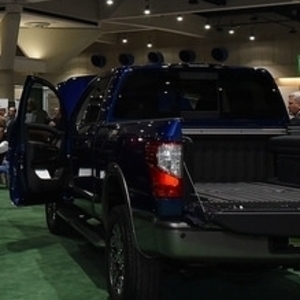Automakers fuel US market with more biodiesel-capable models

January 19, 2017
BY The National Biodiesel Board
U.S. auto manufacturers have introduced a record number of new biodiesel-capable diesel vehicle options for consumers as the push for increased fuel efficiency, performance, and sustainability in America’s transportation sector grows. Despite a challenging marketplace, automakers and fleets remain bullish on new diesel engines that lower carbon emissions by increasing fuel economy over their gasoline counterparts—and that can provide even further benefits when powered by clean, low-carbon biodiesel blends.
“Biodiesel is a renewable, domestically produced fueling option that amplifies the already substantial benefits of new technology diesel vehicles,” said Steve Howell, senior technical advisor for the National Biodiesel Board. “NBB and the U.S. biodiesel industry remain committed to working closely with our partners in the auto and engine manufacturing community to ensure that the high-quality biodiesel fuel of today and tomorrow will continue to provide OEMs, fleets and consumers with a reliable, fit-for-purpose fuel that keeps pace with the nation’s increasing demands for cleaner, more efficient and sustainable modes of transportation.”
Advertisement
Advertisement
Several automakers’ new 2017 diesel models were featured at the San Diego Convention Center as part of the National Biodiesel Conference & Expo. The Biodiesel Vehicle Showcase event is presented by NBB and General Motors Fleet. General Motors is bringing an industry-leading lineup of 20 different diesel vehicle options to market in the 2017-’18 model year, setting records by approving all 20 models for use with B20, a blend of 20 percent biodiesel and 80 percent ultra-low sulfur diesel. One of GM’s flagship models, the 2017 Chevrolet Silverado HD pickup with a 6.6L Duramax turbo diesel engine, was on proud display in the vehicle showcase, and will be joined on the roadways this year by additional GM diesel model offerings in the car, truck, van and compact SUV categories.
Ford Motor Co. also showcased one of its new 2017 B20-capable pickups this week with the Ford F-250 Super Duty powered by its 6.7L Power Stroke turbo diesel V8 engine. And Ford just announced it is adding a new 3.0L Power Stroke turbo diesel engine option to its popular Ford F-150 for 2018, joining the Ford F-Series Super Duty and Ford Transit in the company’s diesel lineup.
Rounding out the pickup options featured in the Biodiesel Vehicle Showcase event was Nissan’s answer to the “Every Duty Truck”, the 2017 Nissan Titan XD powered by a Cummins 5.0L V8 turbo diesel engine.
Advertisement
Advertisement
The important off-road equipment market was also represented in the Biodiesel Vehicle Showcase this week by long-time biodiesel supporter John Deere, featuring its best-selling utility tractor in the San Diego area, the John Deere 5045E with a PowerTech turbocharged diesel engine approved for use with B20 biodiesel blends. John Deere was one of the first OEMs to get involved with biodiesel, approving B5 biodiesel blends for use in its engines in 2001. It was also one of the first off-highway equipment manufacturers to factory-fill biodiesel blends in North America. Since then, John Deere has continued to conduct biodiesel research and perform lab and field tests using biodiesel fuel, and now supports up to B20 or higher biodiesel blends in its equipment.
Customers from coast to coast have used B20 successfully in virtually every make and model diesel engine, and the vast majority of new diesel engines now have full OEM support for B20 with no vehicle modifications required. Yet in the ever-increasing drive to cut carbon and lower CO2 emissions, forward-looking fleets and users are investigating higher biodiesel blends to maximize the reduction in their carbon footprint. To address the interest, another vehicle showcase participant, Optimus Technologies, has begun to manufacture biodiesel conversion systems that enable vehicles to run up to B100—even in the coldest climates. With its simple heated fuel system approach, Optimus could potentially provide fleets an easy and cost-effective way to use pure B100 biodiesel in their existing vehicles and reduce carbon by 80 percent at a fraction of the cost of conversion to other fuel alternatives being considered, like compressed natural gas.
Made from an increasingly diverse mix of resources such as soybean oil, recycled cooking oil and animal fats, biodiesel is a renewable, clean-burning diesel replacement that can be used in existing diesel engines. It is the first and only commercial-scale fuel produced across the U.S. to meet the EPA’s definition as an advanced biofuel—meaning the EPA has determined that biodiesel reduces greenhouse gas emissions by more than 50 percent when compared with petroleum diesel. Americans used more than 2.1 billion gallons of biodiesel in 2015. The National Biodiesel Board is the U.S. trade association representing the biodiesel and renewable hydrocarbon diesel industries, including producers, feedstock suppliers and fuel distributors.
Related Stories
Global digital shipbuilder Incat Crowther announced on June 11 the company has been commissioned by Los Angeles operator Catalina Express to design a new low-emission, renewable diesel-powered passenger ferry.
ATR and French SAF aggregator ATOBA Energy on June 19 signed a memorandum of understanding (MOU) to explore ways to facilitate and accelerate sustainable aviation fuel (SAF) adoption for ATR operators.
Argent Fuels, a leading provider of carbon-saving fuels in the UK, is accelerating its efforts to support a greener future. The expansion of its High Blend Biodiesel will supply to bus, coach, HGV fleets and rail in the south of the UK.
Sprague Operating Resources LLC on June 24 announced it has been selected by the New York City Department of Citywide Administrative Services to supply renewable diesel for its marine fleet, including the iconic Staten Island Ferry.
On June 17, the NYC Department of Citywide Administrative Services and the Department of Transportation announced the start of the Staten Island Ferry’s transition to renewable diesel, marked by the delivery of the first barge of fuel.
Upcoming Events










